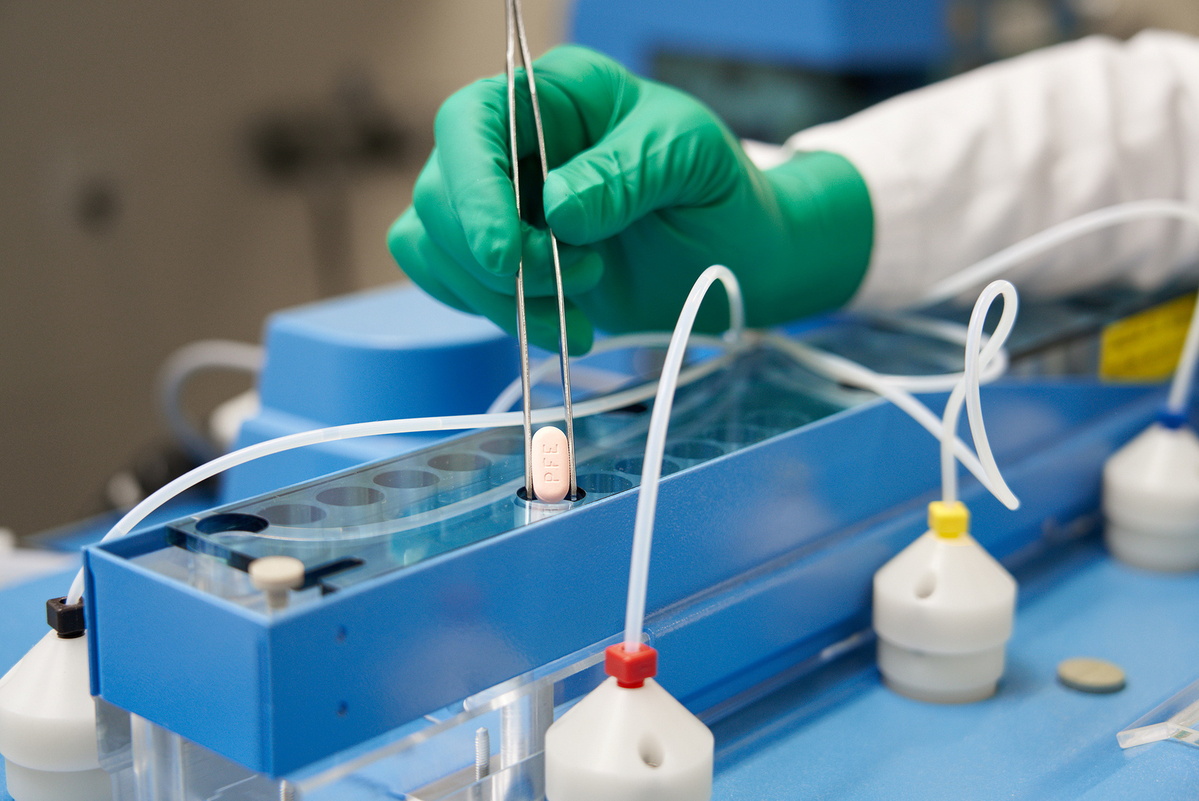Pfizer asks FDA to authorize COVID-19 antiviral pill
By MINLU ZHANG in New York | China Daily Global | Updated: 2021-11-17 14:06

Drugmaker Pfizer said Tuesday that it is seeking US authorization of its experimental COVID-19 antiviral pill for unvaccinated people as the Biden administration plans to buy 10 million courses of the treatment.
The company separately has agreed to allow other manufacturers to make the pill throughout some parts of the developing world.
Pfizer has applied to the Food and Drug Administration (FDA) to authorize its COVID pill. The drug could become available within weeks if authorization is granted.
Earlier this month, Pfizer said its experimental COVID-19 pill — to be sold under the brand name Paxlovid — cut the risk of hospitalization and death from COVID-19 by nearly 90 percent in high-risk people when taken within three days of the onset of symptoms. It would be dispensed by pharmacies and taken at home.
A spokesman for Pfizer, Kit Longley, said that now the company is seeking authorization for its pill to be given only to unvaccinated people, but the company might submit amendments to that provision later, depending on data from clinical trials, according to The New York Times.
Pfizer has said it may have enough treatments to cover between 100,000 to 200,000 people by the end of the year and millions more in the first half of next year.
The Biden administration is expected to announce this week that it is purchasing 10 million courses of Pfizer's COVID pill, people familiar with the agreement told The New York Times.
Meanwhile, Pfizer has signed a deal with a UN-backed Medicines Patent Pool to allow other manufacturers to make its COVID pill in parts of the developing world.
Pfizer said in a statement on Tuesday it would grant a royalty-free license for the antiviral pill to the Geneva-based Medicines Patent Pool. They will receive Pfizer's formula for the drug and be able to produce the pill for use in 95 developing countries, mostly in Africa and Asia, once regulators authorize the drug in those places, making up about 53 percent of the world's population.
The agreement marks the first time the company has agreed to share the technology behind a COVID-19 medical product, in contrast to its refusal to license its vaccine to generic manufacturers.
"We must work to ensure that all people — regardless of where they live or their circumstances — have access to these breakthroughs, and we are pleased to be able to work with MPP to further our commitment to equity," Albert Bourla, Pfizer CEO, said in a statement.
The agreement announced Tuesday excludes a number of poorer countries that have been hit hard by the virus. Brazil, which has one of the world's worst pandemic death tolls, as well as Cuba, Iraq, Libya and Jamaica will have to buy pills from Pfizer. China and Russia are also excluded from the agreement.
Medical Charity Doctors Without Borders said it was "disheartened" by the deal, The Associated Press reported.
"The world knows by now that access to COVID-19 medical tools needs to be guaranteed for everyone, everywhere, if we really want to control this pandemic," said Yuanqiong Hu, a senior legal policy adviser at Doctors Without Borders.
Still, health officials said Tuesday's agreement could help to end the pandemic quicker.
"It's quite significant that we will be able to provide access to a drug that appears to be effective and has just been developed, to more than 4 billion people," said Esteban Burrone, head of policy at the Medicines Patent Pool, AP reported.
He estimated that other drugmakers would be able to start producing the pill within months but acknowledged the agreement wouldn't please everyone.
"We try to strike a very delicate balance between the interests of the (company), the sustainability required by generic producers and most importantly, the public health needs in lower- and middle-income countries," Burrone said.
Pfizer has come under pressure over its refusal to share the technology behind the COVID-19 vaccine it developed with its German partner BioNTech, warning that third-party manufacturers could make mistakes in production that undermine public confidence.
Some health officials claim the company's opposition to sharing intellectual property has contributed to a shortage of doses in low- and middle-income nations, with just 7 percent of Africans fully vaccinated, the Financial Times reported. Less than 1 percent of Pfizer's COVID-19 shots have gone to poorer countries.
The deal Pfizer announced on Tuesday is similar with its rival Merck for its COVID antiviral pill, molnupiravir, to be made and sold inexpensively in 105 poorer countries.
























